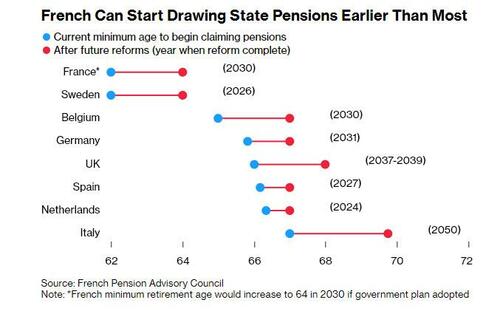
French labor unions have been holding several days of mass strikes and protests against raising the retirement age, in a test of the momentum driving defiance to Emmanuel Macron’s signature economic reform… which is hardly surprising: France is one of the biggest “western” bastions of socialism.
As Bloomberg reports, the country’s rail operator, SNCF, said only one-third of high-speed TGVs were running and urged people to work from home. Subway and commuter trains serving the capital were severely disrupted, with limited service on most lines. Many schools were also closed.
Protesters also blocked three oil refineries operated by TotalEnergies SE and strikes by Electricite de France SA’s workforce took more than 3 gigawatts of nuclear-reactor capacity offline. Air France-KLM’s French arm said it had scrapped 10% of short-haul flights.
Macron, already very unpopular, has faced the biggest protests yet of his time as president on Jan. 19 when the country’s usually fragmented unions united to bring more than 1.1 million people onto the streets. Polls carried out since suggest opposition is growing: a Feb 1 poll carried out by BVA for RTL which surveyed 1,001 people showed that 60% of participants oppose pension reform, up 2 points.
Speaking to French television channels at the start of the Paris March on Tuesday, CGT union head Philippe Martinez said there were more people in the streets than Jan. 19.
“The president and the government must hear the discontent and change their plan,” Martinez said, and perhaps he is right: after all, why work when the ECB can just print and make everyone super wealthy.
According to a government count mid-way through the day, fewer public sector workers went on strike than Jan. 19. Martinez said many chose not to this time in order to preserve their wages, while a bigger turnout of white collar, private sector workers made up the numbers.
Hilariously, France is freaking out about working for two extra years when it has one of the lowest effective retirement ages across the entire developed world.
“It is true that the French are relatively well-off compared to other countries but still we need to protect our system,” said Jean-Philippe, a 47 year-old mechanical engineer who declined to give his family name. “The reasons given by the government are completely fake.” And the reasons not to work given by lazy French workers are… what?
Opponents of raising the minimum retirement age point to 1995, when then President Jacques Chirac abandoned plans to change the pension system after prolonged disruption. More recently, governments have stood their ground, notably in 2010 when Nicolas Sarkozy raised the lower limit to 62 despite months of unrest.
Macron says reform is essential to avoid deficits in the coming years, especially as public finances are already under pressure from massive spending during the Covid pandemic and energy crisis. The International Monetary Fund said on Monday that the reform could help increase labor supply — another key objective of his government, given relatively low employment rates among older workers.
The National Assembly is due to start debating Macron’s bill next week after the social affairs commission completes a review of more than 7,000 amendments. While the government says minor modifications are possible, Prime Minister Elisabeth Borne has insisted the increase of age thresholds is “no longer negotiable.”
The main labor unions will meet in Paris on Tuesday evening to decide their next steps, with further days of action all but inevitable as they seek to keep pressure on lawmakers debating the proposed legislation in coming weeks.
“Madame Prime Minister, you are a reasonable and respectable woman: listen to the discontent with 64 years that is everywhere,” Laurent Berger, leader of the moderate CFDT union, said on France 2 television on Monday. “Back down on this measure and we can talk again.”
As Bloomberg adds, Macron’s task is made harder after he lost an absolute majority in elections last year. His government has tried to secure the support of the conservative Republicains, who have traditionally backed increasing the retirement age, but some have expressed doubts since the first day of protests.
Ultimately, the Macron government could use special constitutional provisions to bypass a vote in parliament, but in doing so would expose itself to a possible no-confidence vote and risk further stoking the anger of protesters.
Loading…



